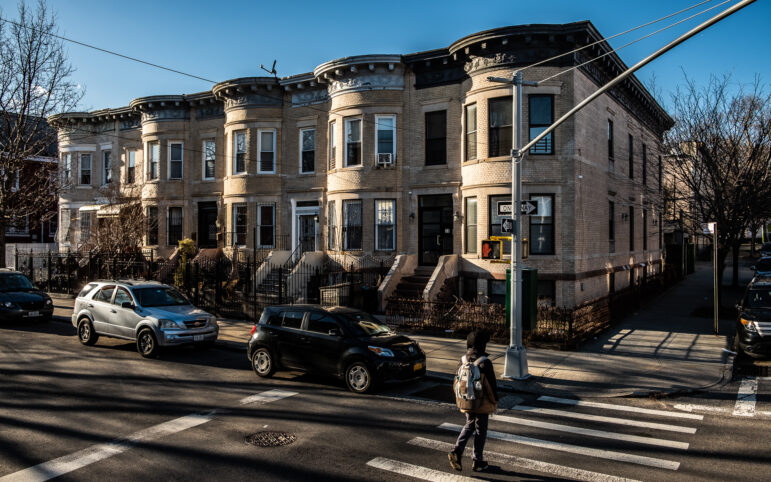
Opinion: It’s Time For a Late Checkout on NYC’s Airbnb Ban
“In New York, the hosts most impacted by Local Law 18 aren’t wealthy property magnates. They’re working families who rely on the supplemental income from short-term rentals to make mortgage payments, pay bills, and navigate the rising cost of living.“
Adi Talwar
Homes along Ridgewood Avenue and Cleveland Street in Brooklyn. The city launched a basement/cellar conversion pilot program in the area in 2019.
CityViews are readers’ opinions, not those of City Limits. Add your voice today!
When New York City effectively banned short-term home rentals, the biggest winner was the hotel industry. Who were the losers? Just about everyone else.
Since Local Law 18 was enacted in 2023, the number of available short-term rental listings in New York City shrank by 92 percent. For a city grappling with a shortage of 227,000 homes, the ban was touted by its proponents as a silver bullet for solving New York’s housing affordability crisis.
Now, 16 months later, New York housing prices haven’t budged. An analysis of preliminary evidence from New York shows that Local Law 18 has failed to ease rental costs or increase the supply of long-term housing.
The underwhelming data from New York isn’t just a fluke. Economic research further demonstrates the limited—and even harmful—impact of short-term rental restrictions on housing prices. In a piece for Harvard Business Review, a group of economists from Wharton, Harvard Business School, and Boston University noted that short-term rentals have a minimal impact on home prices and that short-term rentals can have a positive impact on local tourist economies.
Short-term rental bans aren’t effective as a tool to combat housing costs partly because the fraction of housing stock used for seasonal or recreational use is so small. The vast majority of hosts on platforms like Airbnb rent just one home.
In New York, the hosts most impacted by Local Law 18 aren’t wealthy property magnates. They’re working families who rely on the supplemental income from short-term rentals to make mortgage payments, pay bills, and navigate the rising cost of living. Some Brooklyn homeowners reported a staggering 60 percent cut in monthly income since the restrictions took effect. Imagine losing more than half your paycheck in New York City, where prices are outpacing all other major American cities.
It’s no surprise that the hotel industry championed Local Law 18—but even those same hoteliers could end up regretting the policy in the long run. Last September, the average price of a hotel room in New York City climbed to $417, the highest monthly rate ever recorded in the city. For a week-long vacation, that’s $2,919 spent on accommodations alone—67 percent more than the average American pays in rent.
New York has always been a pricey travel destination, but it’s quickly becoming a place where only the wealthy can afford to visit. In the long term, that’s problematic for local businesses. Even a hotel developer expressed these concerns to the New York Times, describing how limited inventory could drive hotel rates so high that some tourists decide not to visit.
It’s time for a wake-up call on Local Law 18.
Luckily, the New York City Council recently introduced legislation to restore short-term rental rights to small, neighborhood homeowners. The amendments to Local Law 18 would apply only to registered one- and two-family homeowners who live in their homes and do not create any exemptions for investors, speculators, or entities buying or renting homes for short-term rental use.
This legislation is a welcome pressure valve, offering some relief to both homeowners and tourists. City Council should work quickly to enact these amendments so they can turn their focus back to addressing New York’s housing crisis.
It’s encouraging to see ambitious regulatory reform packages gain momentum in New York City, like the recently-passed City of Yes for Housing Opportunity, which aims to add 80,000 new homes over the next 15 years. That’s still not enough to close the city’s housing gap—but it’s a refreshing change of pace that brings New York one step closer to abundant affordable housing.
Adam Kovacevich is founder and CEO of the center-left tech industry coalition Chamber of Progress. Adam has worked at the intersection of tech and politics for 20 years, leading public policy at Google and Lime and serving as a Democratic Hill aide.
The post Opinion: It’s Time For a Late Checkout on NYC’s Airbnb Ban appeared first on City Limits.


